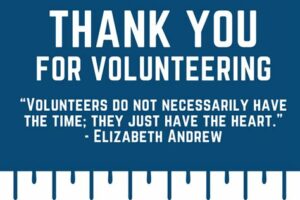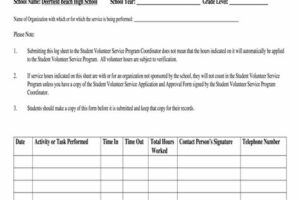Table of Contents
Wondering if you can include volunteer work as part of your work experience? Find out the answer and learn how to effectively showcase your volunteer experience on your resume. Discover the benefits of highlighting your volunteer work and how it can impress potential employers.
Are you wondering if you can include your volunteer work as part of your work experience? The answer is, yes! Incorporating volunteer work into your work experience section can be highly beneficial and showcase your dedication to community service. Not only does it demonstrate your commitment to making a positive impact, but it also highlights valuable skills and experiences gained from volunteering. By strategically presenting your volunteer work alongside your professional experiences, you can present a well-rounded profile that will impress potential employers. So, let’s delve deeper into the reasons why you should consider including your volunteer work in your work experience section.
Can I Put Volunteer Work as Work Experience?
When it comes to building a strong resume, work experience is often a crucial factor that employers consider. But what if you have limited or no professional work experience? Can you include volunteer work in your resume to showcase your skills and dedication? The answer is yes! Including volunteer work in your work experience section can be a valuable addition to your resume, especially if it relates to the position you are applying for.
Why Include Volunteer Work?
Volunteer work can provide you with valuable skills and experiences that are transferable to the workplace. It demonstrates your commitment, passion, and willingness to contribute to a cause or organization without expecting monetary compensation. By including volunteer work in your resume, you can highlight relevant skills and showcase your ability to work in a team, communicate effectively, and take initiative.
Highlighting Transferable Skills
When listing your volunteer work as part of your work experience, focus on the transferable skills you gained during your volunteer activities. These skills can include leadership, teamwork, communication, problem-solving, organization, and project management. By highlighting these skills, you can demonstrate to potential employers that you possess the qualities they are looking for in a candidate, even if you have limited professional experience.
Relevance to the Position
While including volunteer work is beneficial, it’s essential to ensure its relevance to the position you are applying for. If your volunteer work aligns with the skills and responsibilities required for the job, it can strengthen your candidacy. For example, if you are applying for a marketing position, highlighting your volunteer experience in social media management or event planning can showcase your relevant skills and dedication.
Formatting Your Volunteer Work
When including volunteer work in your resume, format it similarly to your professional work experience. Use the same structure, including the organization’s name, your role or title, dates of involvement, and a brief description of your responsibilities and accomplishments. Treat your volunteer work with the same level of professionalism as your paid positions, emphasizing the skills and experiences gained.
The Benefits of Including Volunteer Work on Your Resume
Demonstrating Initiative and Commitment
Volunteer work showcases your initiative and commitment to making a difference. Employers value individuals who go above and beyond their regular duties and actively contribute to their communities. By including volunteer work on your resume, you demonstrate your dedication and willingness to take on responsibilities outside of paid employment.
Filling Employment Gaps
If you have gaps in your work history due to unemployment or other reasons, including volunteer work can help fill those gaps. It shows potential employers that you were actively engaged during those periods and allows you to account for your time effectively. Additionally, volunteer work can help bridge the gap between education and paid employment, providing relevant experiences and skills.
Showcasing Versatility and Adaptability
Volunteer work often exposes individuals to diverse environments, challenges, and tasks. By including volunteer experiences in different roles or organizations, you can showcase your versatility and adaptability. It demonstrates that you can thrive in various settings and are willing to learn and take on new responsibilities.
Building a Strong Network
Volunteer work frequently involves collaborating with other volunteers, staff, and community members. By including volunteer experience on your resume, you not only highlight your teamwork skills but also expand your professional network. The connections you make during volunteer work can lead to opportunities and valuable recommendations in the future.
Conclusion
While volunteer work may not be paid, it holds immense value in terms of skills gained, experiences earned, and dedication demonstrated. Including volunteer work in your work experience section can significantly enhance your resume, particularly if it aligns with the position you are applying for. Make sure to highlight transferable skills, emphasize relevance to the job, and format your volunteer work professionally. By doing so, you can effectively showcase your abilities and increase your chances of securing the desired employment opportunity.
The Value of Volunteer Work: Exploring the Relevance and Importance
Volunteer work offers individuals a unique opportunity to acquire valuable skills, gain practical experience, and contribute to their communities. Although unpaid, such work can provide significant insights and responsibilities that closely resemble professional roles. Engaging in volunteer work demonstrates a commitment to social responsibility and showcases qualities such as empathy, compassion, and a strong work ethic. Employers recognize the value of these characteristics and often view volunteer work as an indicator of a well-rounded individual.
Highlighting Transferable Skills: A Case for Including Volunteer Work
When presenting your work experience, it is essential to emphasize the transferable skills gained from volunteering that align with your desired professional field. Skills such as project management, teamwork, leadership, and problem-solving are often developed through volunteer work and are highly valued by employers. For example, coordinating events as a volunteer requires strong organizational skills, attention to detail, and the ability to work effectively with diverse teams. These skills can easily be transferred to various professional settings and are desirable qualities for employers seeking candidates who can adapt and thrive in dynamic environments.
Relevant Volunteer Work: Determining Its Applicability
While any volunteering experience can be valuable, focusing on roles that closely relate to your desired field can enhance the appeal of your work experience. For example, if you are seeking a career in healthcare, volunteering at a hospital or assisting in a medical clinic would be considered highly relevant. This type of volunteer work allows you to gain firsthand exposure to the industry, understand the challenges and demands of the field, and develop specific skills that are directly applicable to your desired profession. It also demonstrates your genuine interest and passion for the field, which can make you a more attractive candidate to potential employers.
Listing Volunteer Work on Your Resume: Where and How
Including volunteer work on your resume ensures employers are aware of your commitment to community involvement and can provide further insight into your skills and work ethic. Place this information in a dedicated section, clearly indicating the organization, your role, the duration of your service, and a brief description of your responsibilities. Use action verbs to highlight your accomplishments and quantify your impact whenever possible. For example, instead of stating that you helped organize fundraising events, you could specify that you successfully coordinated two major fundraising events, raising over $10,000 for the organization. This demonstrates your ability to take initiative, manage projects, and achieve tangible results.
Positioning Volunteer Work during Interviews: Effective Communication is Key
During interviews, be prepared to discuss your volunteer work in a way that highlights its relevance to the position you are applying for. Link the skills and experiences gained through volunteering to the job requirements and articulate how these transferable skills can benefit the prospective employer. For example, if you volunteered as a mentor for at-risk youth, you can emphasize your ability to connect with and motivate individuals, your strong communication skills, and your capacity to adapt to challenging situations. By effectively communicating the value of your volunteer work, you can showcase your abilities and demonstrate your potential as an asset to the organization.
Leveraging Volunteer Work for Job Applications: Enhancing Your Profile
When applying for a job, consider tailoring your application materials to emphasize the skills and experiences gained from your volunteer work. Highlight specific achievements and outcomes that demonstrate your capabilities and reinforce your suitability for the position. Additionally, include any relevant certifications or training obtained through your volunteer work to further bolster your qualifications. Demonstrating a commitment to community service can demonstrate your dedication, enthusiasm, and ability to handle responsibilities, making you a standout candidate in a competitive job market.
Work Experience Qualifiers: Differentiating between Volunteer and Paid Work
While volunteer work can enhance your resume and provide valuable skills, it is crucial to be transparent about the distinction between volunteer and paid work experience. Clearly differentiate between these experiences to provide employers with accurate information. Specify any paid positions separately from your volunteer work and ensure that you accurately represent the nature of each role. This transparency ensures that employers have a clear understanding of your professional background and can assess your qualifications accordingly.
Networking Opportunities: Forming Connections through Volunteer Work
Volunteering often allows individuals to build strong professional networks and industry contacts. Engaging with like-minded individuals and professionals in your desired field can provide valuable insights, mentorship opportunities, and potential referrals for paid employment. Actively seek out networking opportunities within the organizations you volunteer for, attend industry events, and connect with professionals through online platforms such as LinkedIn. Building these connections can significantly enhance your chances of securing employment or gaining valuable advice and guidance on your career path.
By carefully considering the relevance, skills gained, and effective communication, volunteer work can be a valuable asset to include in your work experience, enhancing your professional profile and increasing your chances of securing employment opportunities. It showcases your commitment to community involvement, highlights your transferable skills, and demonstrates your dedication and passion for your desired field. Incorporating volunteer work into your work experience not only enriches your resume but also adds depth and dimension to your overall professional narrative.
In a professional setting, it is indeed appropriate to include volunteer work as part of your work experience. Although volunteer work may not be paid, it still provides valuable skills and experiences that can be relevant to potential employers. Here are a few reasons why you should consider including volunteer work in the work experience section of your resume:
- Transferable skills: Volunteering often requires a diverse set of skills that can be applicable to many workplace scenarios. These skills can include but are not limited to leadership, teamwork, communication, problem-solving, and adaptability. By showcasing these transferable skills, you demonstrate your ability to contribute effectively in a professional setting.
- Industry relevance: Volunteer work can offer hands-on experience in a specific field or industry, providing you with insights and knowledge that align with your desired career path. Whether you volunteered at a non-profit organization, a healthcare facility, or an educational institution, this experience can be valuable in demonstrating your commitment and passion for a particular cause or industry.
- Networking opportunities: Engaging in volunteer work often allows you to connect with professionals within your chosen field. These connections can lead to referrals, recommendations, or even job opportunities in the future. Including volunteer work in your work experience section highlights your willingness to network and engage with others in a professional capacity.
- Employer values: Many employers value candidates who are actively involved in community service and have a sense of social responsibility. Including volunteer work on your resume can help portray you as a well-rounded individual with strong values, which can be attractive to potential employers who align with those values.
- Personal growth and dedication: Volunteering often requires a significant level of commitment and dedication. By including volunteer work in your work experience, you demonstrate that you are proactive, responsible, and willing to go the extra mile for causes you believe in. This can help differentiate you from other candidates and showcase your personal growth and development.
When including volunteer work in your work experience section, make sure to provide specific details about your roles, responsibilities, and accomplishments. Treat the volunteer experience with the same level of professionalism as you would with paid work experience. By doing so, you can effectively highlight the skills and experiences gained through volunteering, making it a valuable addition to your resume.
Thank you for taking the time to visit our blog and read our article on whether you can put volunteer work as work experience without a title. We hope that you have found the information provided to be enlightening and helpful in your quest for professional development.
In today’s competitive job market, it is crucial to make the most of every opportunity to impress potential employers. While volunteer work may not have the same level of formality as paid work experience, it can still be a valuable asset when highlighting your skills and capabilities to prospective employers. By showcasing your volunteer work as work experience on your resume or during an interview, you can demonstrate your dedication, adaptability, and commitment to making a positive impact in your community.
Transition words such as however and moreover can help you convey your thoughts clearly and effectively. However, it is important to remember that the way you present your volunteer work is just as important as the work itself. When including volunteer work on your resume, it is essential to provide specific details about the tasks and responsibilities you undertook, the skills you developed, and the outcomes you achieved. This will allow potential employers to see the relevance and value of your volunteer experience in relation to the position you are applying for.
Moreover, during an interview, it is essential to highlight the transferable skills and qualities you gained from your volunteer work. For example, if you volunteered at an animal shelter, you could emphasize your ability to work in a team, your compassion, and your ability to handle challenging situations with empathy and patience. By effectively communicating the skills and qualities you acquired through your volunteer work, you can showcase your suitability for the job and leave a lasting impression on the interviewer.
In conclusion, while volunteer work may not come with a formal job title, it should not be underestimated in its ability to enhance your professional profile. By presenting your volunteer work as work experience, utilizing appropriate transition words, and effectively communicating the skills and qualities gained, you can position yourself as a highly desirable candidate in the eyes of potential employers. Remember to provide specific details, highlight transferable skills, and make a compelling case for the relevance of your volunteer experience to the position at hand. Good luck on your professional journey!
.
People also ask about Can I Put Volunteer Work as Work Experience:
Is volunteer work considered work experience?
Can I list volunteer work as professional experience on my resume?
How do I include volunteer work in my work experience section?
Is it beneficial to include volunteer work on a job application?
Will employers value volunteer experience?
Answers:
Volunteer work can be considered as work experience, especially if it is relevant to the job you are applying for. While it may not have been paid, it still provides valuable skills and demonstrates your commitment and dedication.
Absolutely! Listing volunteer work as professional experience on your resume is completely acceptable. It allows you to showcase your skills, responsibilities, and accomplishments during your time as a volunteer, which can be impressive to potential employers.
When including volunteer work in your work experience section, treat it like any other job. Provide a clear job title, the organization you volunteered with, and the dates of your involvement. Use bullet points to highlight your responsibilities and achievements, just like you would for paid positions.
Yes, including volunteer work on a job application can be highly beneficial. It demonstrates your willingness to go above and beyond, your ability to work well with others, and your commitment to making a positive impact. Employers often appreciate candidates who have diverse experiences.
Absolutely! Many employers value volunteer experience because it shows that you are not only focused on your own career but also dedicated to giving back to the community. It can also indicate qualities such as leadership, teamwork, and empathy, which are highly sought after in the professional world.






